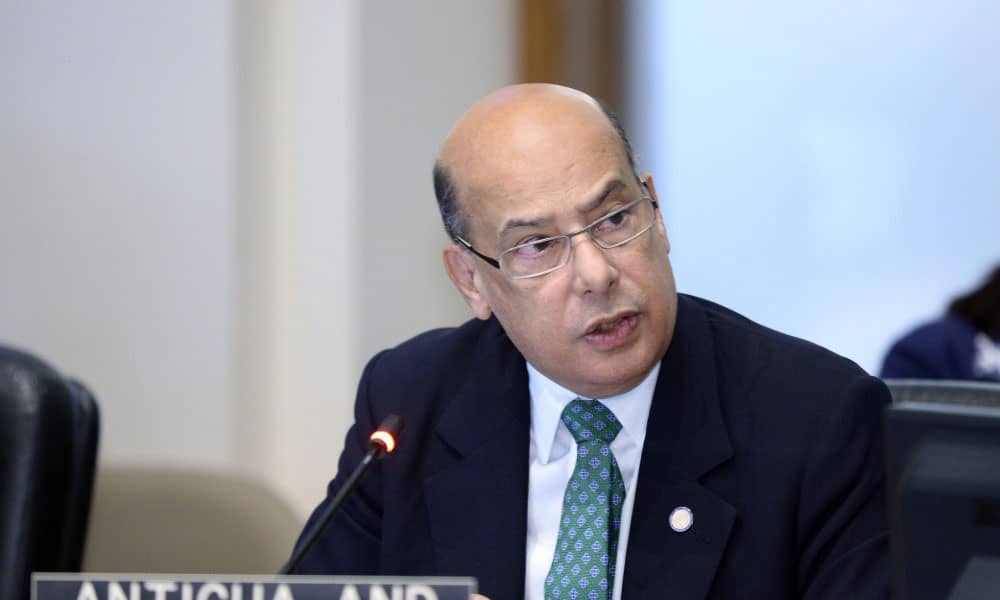
CLICK HERE TO JOIN OUR WHAT’S APP GROUP
By Sir Ronald Sanders
“A nation without borders is not a nation”.
That is the opening line of an advisory issued by the U.S. Department of State on May 15.
It goes on to say, “Our government prioritizes the prosecution of offenses for illegal entry and illegal presence in the United States, as well as criminal offenses by foreign nationals.”
While this statement may resonate with a particular political base in the United States, it also affirms a principle universally upheld.
That principle is: every country has the sovereign right to enforce its immigration laws.
Caribbean countries, like all others, expect their immigration laws to be respected.

The United States is no different.
It is neither extraordinary nor unjust for a government to arrest and deport persons who breach the terms of their stay.
That is the rule of law, and it applies regardless of origin, including to nationals of Caribbean Community (CARICOM) states.
The facts are clear.
With the exception of Haiti, whose unique economic and political fragility forces a flow of asylum seekers, CARICOM nationals are not part of the mass refugee or irregular migration trends into the United States.
However, there is no denying that a number of CARICOM nationals enter the U.S. on legitimate visitor visas and then make the deliberate decision to remain beyond their authorised stay.
In doing so, they step outside the bounds of the law and assume the risk of arrest, detention, deportation, and a permanent bar from re-entry.
When this happens, the diplomatic reach of their home governments is limited.
The most that Embassies and Consulates can do is to engage with U.S. authorities, particularly Immigration and Customs Enforcement (ICE), to ensure that their nationals are treated with dignity and in accordance with international human rights norms.
What foreign missions cannot do is shield those who have wilfully violated the laws of the United States.
The recent advisory issued by the U.S. government is unambiguous. It states that foreign nationals who overstay their visas may face arrest, incarceration, deportation, and permanent bans.
It goes further to announce an “historic opportunity” for those unlawfully present to voluntarily leave the country, with the possibility of receiving financial and logistical assistance to do so – provided they register via an Internet App, set up by U.S. Customs and Border Protection.
This is not rhetoric. U.S. President Donald Trump campaigned on a promise to stop illegal immigration and irregular border crossings. It was a key plank of his re-election platform and one that resonated with millions of voters.
That pledge is now being aggressively implemented, and there is little political appetite in the United States to challenge it. Foreign nationals – Caribbean nationals included – should take this reality seriously.
There are many legitimate reasons to travel to the United States: tourism, business, specialised medical care, and education, among others. But those who abuse their visas cast a long shadow over others whose intentions are lawful and honourable.
Worse still, they jeopardise the credibility of their countries in visa issuance processes, and they create burdens for their own diplomatic missions, who must deal with requests for assistance with limited resources and within the confines of U.S. law.
Equally important, the recent advisory warns that the U.S. “will not tolerate those who facilitate illegal and mass immigration.”
It states quite clearly that new visa restrictions would be placed “on foreign government officials and others deemed complicit”.
The message is blunt: countries that fail to act responsibly in discouraging illegal migration may see broader consequences.
We in the Caribbean must be clear-eyed about the global context of migration.
The hardening of immigration policy in the U.S. and Europe will have knock-on effects, globally, especially to countries such as ours which are doing better than most economically.
We may soon see an increase in people attempting to enter our own countries – some seeking asylum, others simply looking for work as migration avenues close elsewhere.
Our economies, already fragile, will not be able to bear such strain without careful planning and legal safeguards.
Many of our counties are also tourism-dependent.
They will have to exercise special care and put judicious mechanisms in place to identify genuine tourists and business visitors from potential illegal immigrants.
Immigration systems will have to be fortified – not to close borders, but to manage them with fairness and foresight.
At the same time, there is room for constructive diplomacy with the U.S. and other countries, such as Canada.
The labour shortages already emerging in the U.S. in hospitality, construction, and agriculture offer an opportunity for dialogue on regularised seasonal and temporary work programmes.
CARICOM countries could benefit from well-managed migration frameworks that provide legal pathways for temporary work and return, ensuring the interests of both sending and receiving states are met.
The path forward should be neither protest against U.S. efforts to end illegal immigration nor denial that such violations exist.
It should be grounded in realism and responsibility, coupled with creative proposals that open channels for legitimate, temporary work opportunities and the assured return of Caribbean nationals.
CLICK HERE TO JOIN OUR WHAT’S APP GROUP
CLICK HERE TO JOIN OUR WHAT’S APP GROUP
CLICK HERE TO JOIN OUR WHAT’S APP GROUP
CLICK HERE TO JOIN OUR WHAT’S APP GROUP
CLICK HERE TO JOIN OUR WHAT’S APP GROUP
CLICK HERE TO JOIN OUR WHAT’S APP GROUP
CLICK HERE TO JOIN OUR WHAT’S APP GROUP
CLICK HERE TO JOIN OUR WHAT’S APP GROUP
Advertise with the mоѕt vіѕіtеd nеwѕ ѕіtе іn Antigua!
We offer fully customizable and flexible digital marketing packages.
Contact us at [email protected]

















Good article. Too many are misled by false promises from shady agents.
I appreciate the straightforward tone of the commentary.
Important read. Immigration laws don’t bend for anyone, no matter where you’re from.
Always look foward to Mr Sanders Commentary… Nice one
This article failed to address that the US government is currently at the Supreme Court on Birthright Citizenship.
This type illegal immigration that has been one of most popular.
It is “birth tourism” or the practice of women from abroad visiting the United States for the purpose of giving birth and conferring U.S. citizenship on their offspring.
Should the Supreme Court rule against Burthright Citizenship a large number of Antiguans and Barbudans will loose tgrir US citizenship
Comments are closed.